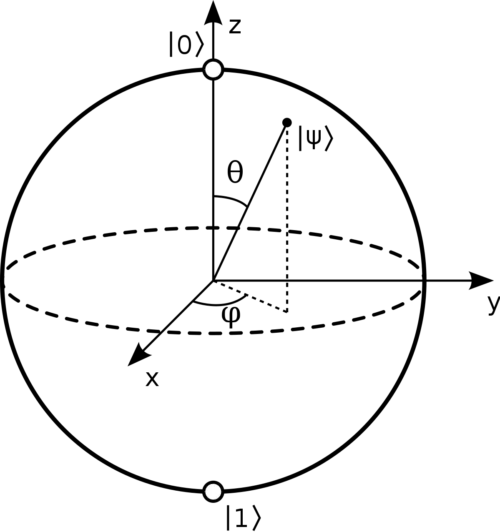
This article is my attempt at collecting several learning resources available online for learning quantum computing at different levels. If a really cool resource is not listed here, feel free to add it in the comments or write to me so I can add it to the list!
So you have finally been persuaded – quantum computing is cool – and you have decided to embark on the journey of learning the ropes. First off, congratulations on taking the first step! This article is an attempt at helping you go from that decision to landing on the learning resource that fits you best.
There are lots of cool tools out there, some aimed at beginners, some at advanced learners, some include programming, others games and interactive learning. And you, my friend, you may be a really motivated high school student (keep it up!), or an undergraduate student, trying to figure out whether this is your calling. Or you might be a professional scientist who deliberated that it’s time to pivot towards quantum computing and incorporate those key skills into your portfolio. Or yet you might be a manager within a small-medium industry, or a large corporation, and you feel you will soon need to take decisions which involve understanding the potential and applications of quantum computing to your specific field. You might be a math wizard, using your mathematical brain every day in your job, or you might feel quite rusty with the math, or even terrified to go back there.
The profiles and backgrounds of people looking to learn more about quantum computing can be very diverse. Yet, quantum computing is a complex and interdisciplinary field that includes theoretical physics and maths, engineering, electronics and programming. As scientists keep developing the hardware, we are starting to explore the applications space, which marries quantum computing with the specific application, be it pharmaceuticals, finance, battery development, chemical engineering and many more. On one hand, experts in those fields will be identifying the computational challenges they face, on the other quantum computing experts will be developing algorithms targeted to solving those challenges.
So, where should you begin?
I’ve separated resources according to their level of detail and level of math, conscious especially of the fact that math is not a language that everyone is accustomed to.
Introductions to quantum computing
No maths
Let’s begin with some short videos:
- Quantum computers explained by Kurtzgesagt https://www.youtube.com/watch?v=JhHMJCUmq28&t=4s
- The map of quantum computing by D. Walliman: https://www.youtube.com/watch?v=-UlxHPIEVqA
- A beginner’s guide to quantum computing by S. Ghose: https://www.youtube.com/watch?v=QuR969uMICM&t=101s
- Quantum computing on 5 levels of difficulty by IBM: https://www.youtube.com/watch?v=OWJCfOvochA
- A Ted-Ed video I scripted a while ago: https://www.ted.com/talks/chiara_decaroli_the_high_stakes_race_to_make_quantum_computers_work
And popular science books:
- Quantum Theory cannot hurt you: https://www.goodreads.com/book/show/2330343.Quantum_Theory_Cannot_Hurt_You
- How to teach quantum physics to your dog: https://www.goodreads.com/book/show/8243716-how-to-teach-quantum-physics-to-your-dog
And what about learning while playing?
- https://qplaylearn.com/: fantastic free resources (including games, videos and short explainers) developed by quantum computing researchers
- Quantum Games and Interactive Tools for Quantum Technologies Outreach and Education: this paper https://arxiv.org/abs/2202.07756 (2022) is a survey of all the great quantum games out there, beware, you’ll definitely get stuck into them! (My personal favourite is the quantum game with photons, which I helped develop (therefore I am biased): https://play.quantumgame.io/)
Of course, there are also plenty of articles, if you’d rather read up on it, such as:
- https://www.newscientist.com/question/what-is-a-quantum-computer/
- https://www.technologyreview.com/2019/01/29/66141/what-is-quantum-computing/
- https://www.quantamagazine.org/why-is-quantum-computing-so-hard-to-explain-20210608/
- https://qtedu.eu/: the website of the European Quantum Flagship initiative has many overviews as well as educational resources
With maths (but my maths is rusty)
- Introduction to Classical and Quantum Computing, by Thomas Wong, takes learners all the way from the basics through computation and quantum computation. You can find a free pdf here: https://www.thomaswong.net/, or buy the textbook on Amazon for a very affordable price.
- Black Opal, by Q-CTRL, is an interactive course full of hands-on exercises and visualisations. https://try.q-ctrl.com/blackopal-app/?gclid=Cj0KCQjwzqSWBhDPARIsAK38LY9alRbtxORYXJXhp4Iy92UBDLRPCag9-azOsx12mbRRqiS6KShfAQEaAu-NEALw_wcB
- The MIT Quantum Computing Fundamentals course might be right for you!
- Delft’s QuTech researchers have put together: https://qutechacademy.nl/ with lots of resources targeted to different learners
- Quantum Country by A. Matuschack and M. Nielsen: https://quantum.country/, one of my absolute favourite introductions to quantum computing, with relatively little (but extremely well explained) math!
With maths (my maths is pretty fluent)
- This short article is a good place to start, it contains a number of resources for more advanced learners: https://www.nature.com/articles/d41586-021-00533-x
- The IBM’s Qiskit textbook is likely the best resource to learn while also being able to try hands-on programming algorithms and running them on quantum machines: https://qiskit.org/textbook/preface.html
- Quantum Computation and Quantum Information, by Nielsen and Chuang, is still the “Bible” textbook: https://www.cambridge.org/highereducation/books/quantum-computation-and-quantum-information/01E10196D0A682A6AEFFEA52D53BE9AE#overview
- The QBraid platform has a number of free resources exploring theory, programming, and hands-on exercises: https://qbraid.com/
- There are also lots of online courses, such as: https://www.edx.org/professional-certificate/delftx-quantum-computing-and-quantum-internet and https://www.edx.org/course/fundamentals-of-quantum-information
Special topic: quantum algorithms
If you want to delve a little deeper into the quantum algorithms topic, this is a list of resources *I* found useful.
- Quantum algorithms: an overview. By Ashley Montanaro, a professor at Bristol University and founder of PhaseCraft. The article is from 2016. https://www.nature.com/articles/npjqi201523. A snippet from the article: “Here we briefly survey some known quantum algorithms, with an emphasis on a broad overview of their applications rather than their technical details. We include a discussion of recent developments and near-term applications of quantum algorithms.”
- Quantum Protocols and Quantum Algorithms — Qiskit Textbook: https://qiskit.org/textbook/ch-algorithms/index.html
- Noisy intermediate-scale quantum algorithms (2021): https://arxiv.org/pdf/2101.08448.pdf
- 5 quantum algorithms that will change the world. A brief video introduction by Anastasia Marchenkova (2022) covering VQE, QUBO, QML, Grover and Shor: https://www.youtube.com/watch?v=_54i80UFHSs
- Basic quantum algorithms by Renato Portugal (2022): https://arxiv.org/pdf/2201.10574.pdf
- VQE Method: A Short Survey and Recent Developments (2021): https://arxiv.org/pdf/2103.08505.pdf. A snippet from the article: “The VQE method was introduced to mitigate the significant hardware demands needed by the QPE approach on NISQ devices. VQE is a hybrid quantum-classical algorithm, where the computational workload is shared between the classical and quantum components of the hardware.”
Special topic: nurturing your career in quantum
- Getting started in quantum in 2021: https://www.youtube.com/watch?v=as7azj8KJI8
- https://jobs.quantumdelta.nl/jobs: a portal of jobs in NL (and EU)
- https://qureca.com/ has lots of resources related to Education and Careers in Quantum. Don’t miss their recent article: https://www.spiedigitallibrary.org/journals/optical-engineering/volume-61/issue-08/081806/Defining-the-quantum-workforce-landscape–a-review-of-global/10.1117/1.OE.61.8.081806.full?SSO=1
Special topic: keeping an eye on quantum developments
If what you are looking for is a quick digest of the latest developments in quantum, then these resources might be up your alley (apologies, I am sure I am forgetting a lot here, please add them in the comments!):
- The Quantum Insider: https://thequantuminsider.com/
- The Quantum Computing Report: https://quantumcomputingreport.com/
- Fact-Based Insight: https://www.factbasedinsight.com/
- Reading the Quantum by M. Malinowski: https://m-malinowski.github.io/2022/05/21/ti-best-and-worst.html
- The Quantum Observer’s blog: https://quantumobserver.substack.com/
- Understanding Quantum Technologies by O. Ezratty: https://www.oezratty.net/wordpress/2021/understanding-quantum-technologies-2021/ (and his fantastic podcast — sadly only in french: https://www.oezratty.net/wordpress/podcasts-quantiques/)
So, I hope you’ve found here something that will keep your mind occupied and happy for a while! I believe Quantum is not the easiest of topics to approach, and given the diversity of backgrounds of learners, it’s useful to have tailored paths, to avoid feeling discouraged or disappointed. Please remember, quantum needs you and you can build the skills you need to join this exciting field of technology!
This article was originally published on Medium by Chiara Decaroli and can be found through this link: https://decarolichiara.medium.com/a-guide-to-online-mostly-free-resources-for-learning-quantum-computing-9b3468522b49


